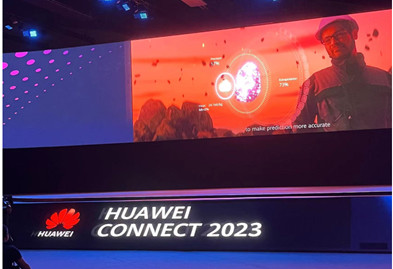Research Note

October 2023 Huawei Connect – new focus on AI
Abstract
by Tom William and Vlad Kozlov
Huawei Connect 2023, which was held in the Shanghai Convention Center on September 20-22 was an event for the company’s customers and partners rather than being primarily for industry analysts. Thousands of technology professionals attended including hundreds from outside of China.
One key takeaway was that the Huawei innovation engine was back to firing on all cylinders. Huawei recently introduced new smartphones that incorporate advanced chips believed to be domestically produced at 7nm gating by SMIC.
The in-China sales of Apple’s iPhone 15 and Samsung’s flagship phones are feeling the heat from Huawei’s reentry into the high end of the smartphone market. Huawei’s brand-new Mate 60 Pro+, with a 6.82-inch LTPO OLED screen, Kirin 9000s chipset, three 40MP cameras, satellite call functionality, and a 5,000 mAh battery is selling very well in China and Huawei plans to ship between 60 and 70 million smartphones in 2024. Analysts expect Huawei to manufacture 15 million smartphones powered by its proprietary Kirin chips in 2023.
Huawei has placed sufficient orders with its supply chain to ensure that it can meet this shipment target for 2024. This target represents a 100% increase in shipments compared to 2022. However, it is still only the equivalent of Huawei’s total shipments in 2014. Huawei reached its peak in smartphone shipments in 2019, when 240 million units were shipped. That year Huawei surpassed Apple’s global iPhone shipments of 198 million units. Shortly after that, the US government hit Huawei with sanctions (for national security reasons), forcing the company to divest the smart phone business. Not sure if the US is more secure now, but the sanctions certainly secured Apple’s market leadership, at least for now.
Huawei has extended the development of its optical technologies from the communications sector into the automotive sector, creating intelligent in-car optical products such as light field displays, intelligent car lights, and AR-HUD driver assistant systems.
The company unveiled its Pangu large language model which is intended to help autonomous driving systems cope with complex scenarios in a two-day long learning cycle by constructing digital twin spaces and generating complex scene samples for them. The model will also aid in various business scenarios within the auto industry, including automotive design, production, marketing, and research and development.
Despite the company’s remarkable renewed success in chips, phones and vehicles the main theme of the Connect 2023 conference was Artificial Intelligence.
Meng Wanzhou, the company’s CFO who also currently holds the rotating chairwoman position at Huawei Technologies, outlined the company’s new “All Intelligence” strategy on September 20th. “All Intelligence” is a once-in-a-decade strategic shift from the “All Cloud” strategy introduced in 2013 and the “All IP” strategy unveiled in 2003.
Under the “All Intelligence” strategy Huawei will continue to build a solid computing backbone to enable a vast variety of AI models and applications for every industry. From training to inference Huawei provides a robust computing backbone for every situation. To enable a vast range of models and applications, Huawei will continue to open up its hardware for integration with open-source software to foster a vibrant computing ecosystem.
Zhang Ping’an, the executive chairman and CEO of Huawei Cloud noted Pangu 3.0, released in July 2023, is actually a series of models specifically designed for various industries with specific models for government affairs, finance, mining, railroads, and meteorology. Huawei has extended the application of its Pangu LLM to scenarios including coal mining, weather forecasting, and medical care.
Building intelligent and efficient AI algorithms requires a deep understanding of each business, accurate mathematical modeling, a high-quality big data platform and a high-performance computing backbone. Intelligent transformation requires both digging deeply into the businesses’ processes and allocating key business resources to achieve the ultimate goals. In 2023, the Huawei Cloud will assign 200 PhDs to some of its customers’ premises so that its customers will have access to deeply integrated, innovative AI technologies within their business.
The full text of the research note is available to LightCounting subscribers at: https://www.lightcounting.com/login
